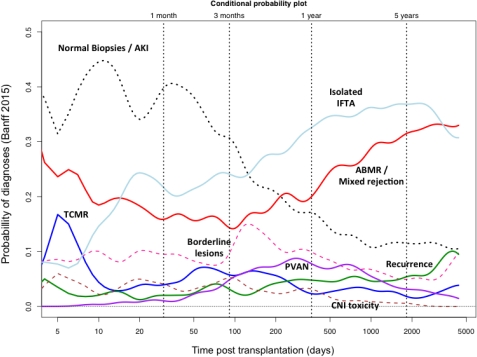Identifying the Specific Causes of Kidney Allograft Loss: A Population Based Study
Paris Translational Research Center for Organ Transplantation, Paris, France.
Meeting: 2018 American Transplant Congress
Abstract number: 316
Keywords: Graft failure, Kidney transplantation, Risk factors
Session Information
Session Name: Concurrent Session: Kidney Complications: Late Graft Failure
Session Type: Concurrent Session
Date: Monday, June 4, 2018
Session Time: 4:30pm-6:00pm
 Presentation Time: 4:30pm-4:42pm
Presentation Time: 4:30pm-4:42pm
Location: Room 6E
Understanding the specific causes of kidney allograft loss is mandatory to improve the longevity of kidney allografts. However, the current literature is limited by the low level of phenotyping, small series with selected populations or data from registries that lack precision diagnoses.
We conducted a multicentric prospective study including unselected kidney transplant recipients from 4 referral centers transplanted between 2004 and 2014. Donor and recipient transplant parameters, clinical and biological post transplant parameters as well as circulating anti-HLA DSA and allograft biopsies performed post transplant (protocol and for causes) were included. The main outcome was long-term kidney allograft survival and specific causes of allograft loss.
Main analyzes comprised 4,921 kidney recipients. A total of 10,293 kidney allograft biopsies were analyzed (4778 protocol biopsies and 5515 for cause). During a median follow-up post transplant of 6.52 years, 929 graft losses occurred. After inclusion of biopsy, clinical, biological, and anti HLA DSA data, a primary cause was identified in 96% of cases. The causes of loss were: immune related (32% of antibody-mediated rejection, 4.5% of T-cell mediated rejection), surgical related (21% of thrombosis, 2.5% of urinary disease), medical related (tumoral, infectious or cardiac intercurrent disease (20%), recurrence of primary disease (7.5%), virus related (BK or CMV associated nephropathy, 5.5%) and calcineurin inhibitor nephrotoxicity (1.5%). After exclusion of primary non-function and early vascular and urological complications, antibody-mediated rejection was the leading diagnosis for allograft failures (40%). Antibody-mediated rejection was associated with the worse allograft survival (55% at 9 years). Conditional probability plot of allograft diagnoses give the dynamic range of allograft injuries with time (Figure 1).
In this multicentric extensively phenotyped population of kidney transplant recipients, we identify the contemporary picture of specific causes of kidney graft loss. Such effort highlights the current priorities to detect such complications to improve long-term allograft outcomes.
CITATION INFORMATION: Loheac C., Aubert O., VIglietti D., Kamar N., Delahousse M., Lefaucheur C., Loupy A. Identifying the Specific Causes of Kidney Allograft Loss: A Population Based Study Am J Transplant. 2017;17 (suppl 3).
To cite this abstract in AMA style:
Loheac C, Aubert O, VIglietti D, Kamar N, Delahousse M, Lefaucheur C, Loupy A. Identifying the Specific Causes of Kidney Allograft Loss: A Population Based Study [abstract]. https://atcmeetingabstracts.com/abstract/identifying-the-specific-causes-of-kidney-allograft-loss-a-population-based-study/. Accessed January 29, 2026.« Back to 2018 American Transplant Congress

